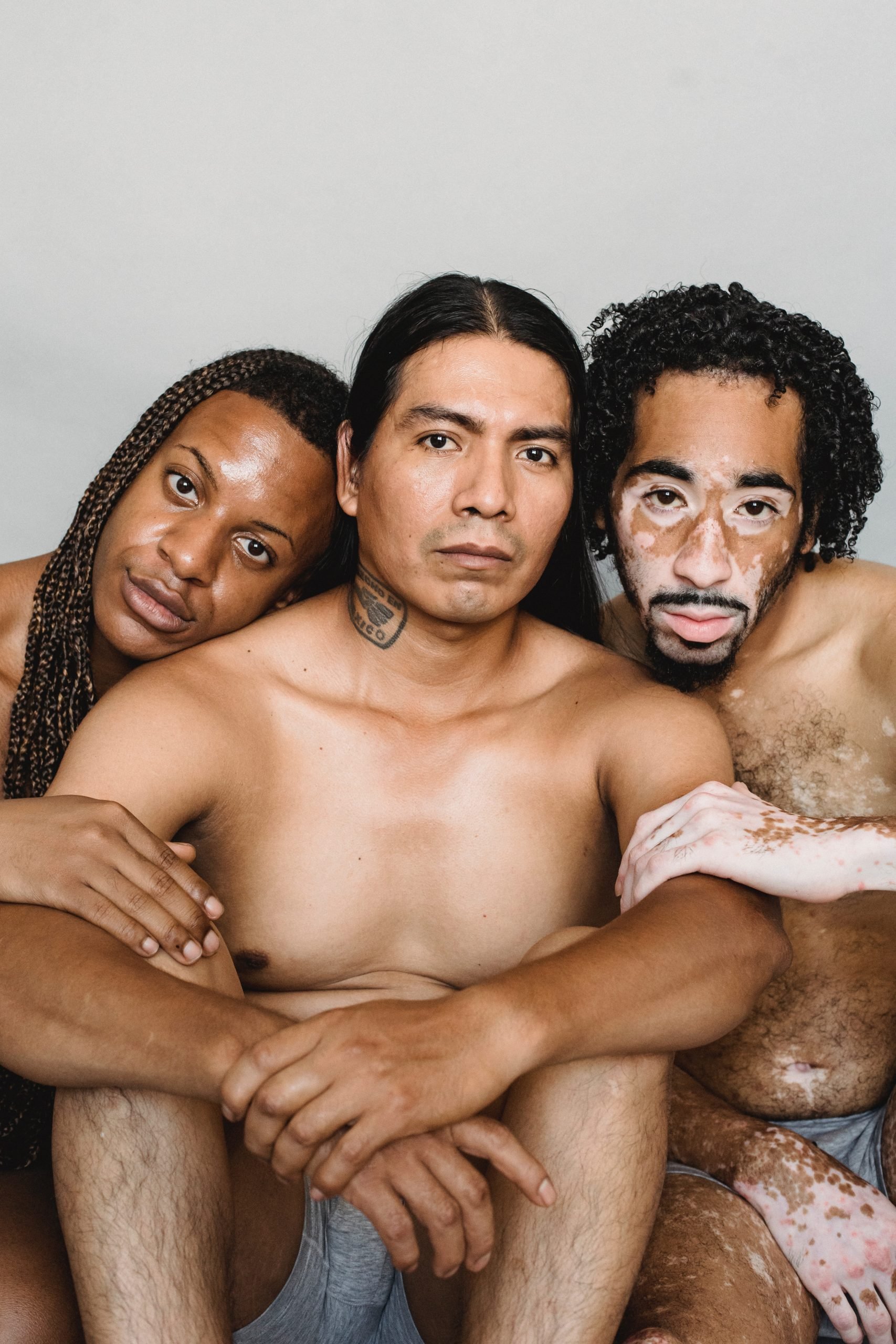From an early age, we’re taught to unconsciously categorise those around us and even ourselves.
Everyone is given a label. We’re taught that with those labels come certain expectations of what is “normal.”
I’m a boy. I won’t like pink, so I’ll wear blue instead. I’ll want to play sports or violent computer games, and my self-worth will be based on how masculine I can be.
Once I’m an adult, I’ll take part in the “lad” culture, where we’ll drink endless pints of lager, engage in banter, and won’t ever show a single shred of emotion for fear of being singled out and not being man enough. Well, at least I will if I live in the United Kingdom.
Then, we’ll be expected to become leaders of others, professionals, or work in manly trades. Anything else just isn’t what is anticipated from us. That’s what men do.
Girls, however, are dressed in pink clothes from an early age, are told that their self-worth is based on their looks, and given dolls to play with, because why would they ever want a PlayStation 5? And as they age, they are often directed toward job roles that help men such as secretaries, nurses, or, ultimately, they become mothers.
It’s not just our genders that are given labels with expectations attached to them, we are also given labels based on where we live. There are different labels within each country. For example, in the UK, there’s Southerners and Northerners. The Southerners are seen as “softies,” and the Northerners are seen as “monkeys,” not in the racist sense, but they’re labelled as less intelligent and more brutish.
This expands out to other nations through the blanket-labelling of entire groups of people from a country, as if every single person from that country has the same hopes, dreams, and drivers as their fellow citizens.
Then, there are those socially-driven labels. When I was at school during the 80s in the UK, there were refined definitive divisions between groups of children. I was in the “alternative” faction. Generally, we all liked non-mainstream, non-conformist music and wore a certain type of clothing. We never wore anything that was considered smart and we tried (tried being the operative word) not to conform to social expectations of labels such as “male” and “female.”
We did what we wanted to do, and we wanted to be different. Yet strangely, we all looked so similar.
The other group was known as the “casuals,” and they, too, had their own subdivisions. But on the whole, they liked mainstream chart music, dressed in smart-casual clothing—always trying to look their best, and they generally complied with the social expectations society had placed on them. Girls were “girly” and boys were definitely bloke-like.
We, the alternatives, looked down our noses at the causals, seeing them as somehow less than us—less intelligent even—because they didn’t want to fight social expectations. Meanwhile, they also looked down their noses at us, thinking we were different or just plain bizarre. Both groups of people had “othered” the opposite group. It made it so much easier to just be nasty to each other, and we were horrible because it’s easy to not be nice to someone when they’ve got a label on their back that is different from our own.
That is just one example, but we’ve all seen how the labels of “man” and “woman” cause divisions. There are man-haters and woman-haters as if all men were the same as every other man and all women were exactly the same. People can act that way toward another person simply because they’ve got a different social label.
It goes beyond outright hate and aggression between different groups of people as well. There are more subtle twists to labelling others. Whilst it’s been many years since I’ve done this, who hasn’t used male pronouns when they’ve heard someone talking about a doctor only to find out the doctor was a female?
Then, there’s the surprise at the male nurse. A man who’s a nurse? How odd. There’s probably something wrong with him. Those subtle distinctions feed down through the whole of society to the next generation and make it tougher for everyone to cross those human-made boundaries into areas where they’re not expected to be. And those who do dare to cross them are treated with hostility by other people. Thankfully, those numbers are going down, even if the progress is too slow, at least in terms of sexism.
The same goes for race and nationality. These labels are a racist’s wet dream. They make it so easy to brand people and, then, hate them, and when we do, we’re hating a person with a label that makes us see them as less than human.
And that is what labels do. They not only “other” different people, but they also make that group of people, which we don’t belong to, somehow seem less human. Their humanity is lost and that is a dangerous road to slip down because it’s much easier to wrong someone, sometimes even with deadly consequences, whom we don’t recognise as the same as us.
There have been great strides in the right direction in some ways. Women aren’t stopped from getting to the top of businesses or professions. They’re not stopped from taking roles that are considered manly; however, we’ve still got a long way to go because far more men than women have access to those advantages.
Women are just as good as men, but the expectations around those labels still hold so many women back. The same goes for national-based expectations. No Indian is the same as the next Indian, and the same goes for Brits, Americans, South Africans, or any nationality at all. All stereotypes are wrong in nearly every case.
Whilst many of us are fighting categorisations of groups of people, labels continue to divide us, and more labels are created. I’m 47 years old, and I have never seen so much division around the political sphere as I see now. In the United States, you are either a Trump supporter or a Democrat. In the UK, you’re either a Brexiter or a Remainer. There are so many similar splits throughout the world right now, and each side sees the other group as awful.
There has always been left and right. And although there has always been some hostility, in the UK at least, you used to see supporters of one government party having respect for supporters of other parties. There were people of principle on both sides of the argument—both as politicians and supporters, and people had a certain level of respect for each other. Those who “othered” the opposite side used to be far fewer in number than they are now.
Now, all politicians on the right are self-serving or a lackey for the mega-wealthy. Many people don’t just disagree with them, they almost consider them evil—someone to be looked down upon with hatred. Their supporters are disgusting idiots who are incapable of realising they’ve been duped and vice versa. No one sees the humanity of the other side anymore. The labels we use are creating more divisions.
There are so many other labels that have arisen recently, with the most prominent one being “Karen.” Someone, always a woman, does something that another person doesn’t agree with, or is considered too vocal, and they’re immediately labelled a Karen. That person is, therefore, open to abuse as they clearly deserve it.
However, we don’t see the mum who’s dropping her children off at school every day, worried about them. We don’t see the person who remembers the time they were attacked as a teenager and is full of hurt because of all that they’ve been through. Calling them Karen because of that one incident, out of their entire life, gets them a label that means they are bad and need to be got rid of, somehow. Meanwhile, all the good they may do is ignored.
Does labelling someone a Karen or anything else build bridges and clear a path for more understanding and discourse? Or does it cause more division? I’d suggest it’s the latter, and who is that really good for? It’s not good for the person labelling another and it’s not great for the labelled person either. And it certainly doesn’t bring about a peaceful society.
I appreciate there’s a lot of terrible behaviours out there, and it’s easy to become frustrated and presume that someone doing something we might consider wrong is bad in all ways. I get that, I’m not superhuman, and I’ve labelled other people myself. But as soon as I notice what I have been doing, I try to step back from that behaviour.
I’m not suggesting we shut up and stop fighting the wrongs of the world either. We need to do that with all our worth. what I’m suggesting is that we fight the behaviour, draw boundaries—or whatever we need to do—but to do so with compassion for the other person because believe they are humans too. With the exception of possibly psychopaths and sociopaths, all other personality types do have a level of humanity. They can and are likely to be hurting. They just react to their hurt in a different way than to you or me.
Labelling a person and treating them with contempt, rather than focusing on the behaviour itself and engaging with them, will just enforce the very societal behaviours we want to change. Ultimately, we have to act in a way we wish others would. We need to be that example, because if we’d don’t act with integrity ourselves, then what do we have?
I’m not naive. I understand that if we stick to our principles, the majority of those we would like to do better aren’t going to change. But some will. It won’t be immediate, but some will definitely move in the right direction. But if we had just labelled them instead, then that might never happen.
I’ll end by telling you about the time when I was 17. On Saturdays, I used to work at a restaurant connected to one of the UK’s supermarket chains to earn myself a bit of cash whilst at school. One day, one of the causals from school started work in the same restaurant. I can remember thinking that it was a nightmare to have to work with one of the causals from school. It was the last thing I wanted to do because, you know, they suck.
But the thing is, we both wore the same work clothes, and without our social uniforms, a barrier was broken down between us. Yes, we had different tastes in music and we also expressed ourselves in slightly different ways, but it turned out we had a lot more in common than either of us would have believed. We both wanted to work so we could have fun with our friends, we both wanted to have friends, we wanted to be liked, we wanted to belong, we wanted to laugh, and, actually, working alongside him was fun and we did end up laughing. And, most of all, we both wanted a good future.
He was a casual and I was an alternative. But in reality, we were both just human beings trying to get on in life.
Thirty years ago, I learned that a label, and the expectations and judgements connected to that label, strips a person of their humanity in our eyes, which makes it easier for us to dislike, judge, and, therefore, treat that person badly.
Yet, we have no idea what their life is like outside of our field of vision. Our judgement and hate, based on the small amount we have witnessed, can add to their suffering, as well as to our own.
And is this something we really want to do?









Read 17 comments and reply